You’re a proud boat owner, captivated by the allure of shimmering waters and tranquil sounds of the wave. Among the essentials of your maritime escapades is ensuring your boat’s engine operates efficiently and quietly. Your boat represents freedom and relaxation, but when your engine starts sputtering and making unpleasant noises, that tranquility can swiftly dissipate. The article, “The Best Ways To Keep Your Boat Engine Running Smooth and Quiet,” will teach you how to maintain your boat engine in tiptop condition, guaranteeing you smooth sailing and uninterrupted tranquillity. Learn proven techniques to keep your boat engine running like a well-oiled machine, ensuring your sea adventures remain serene and enjoyable.
Understanding the Basics of Boat Engines
Understanding the basics of boat engines is crucial for any boat owner. Boat engines are a key component of your vessel, and ensuring they function properly is of utmost importance.
Different Types of Boat Engines
Boat engines, much like cars, come in different types. There are primarily two types of engines: inboard engines and outboard engines. Inboard boat engines are installed within the boat’s structure and are typically more powerful, suitable for larger boats. On the other hand, outboard engines are mounted outside the boat, usually at the stern. They are lightweight, less expensive, and easier to maintain.
Basic Structure and Functionality of Boat Engines
The structure of boat engines can vary depending on the type. An inboard marine engine is similar to a car engine. It includes parts like a crankshaft, cylinders, and spark plugs, just to name a few. The functionality also mimics a car engine, where fuel combustion leads to movement of pistons that turns the crankshaft, thereby propelling the boat.
Importance of a Smooth Running Engine for Boating Performance
A smooth running engine is absolutely important for optimal boating performance. Other than ensuring that the boat moves at a desirable speed, a well-functioning engine also allows for more fuel efficiency, reliability, and longevity of your boat’s lifespan.
Regular Cleaning of the Boat Engine
A clean engine is a happy engine! Regular cleaning is a key aspect of basic engine maintenance and can ensure smooth operation.
Importance of Regular Engine Cleaning
Regular engine cleaning can lead to an easy identification of any issues, a smoother operation, and a reduction in risk of engine performance problems. It also minimizes the chance of oil and grime build-up, which can impede the engine’s operations.
Steps for Cleaning Your Boat Engine
Cleaning your boat engine encompasses a few steps. Start by removing any excess dirt or debris from the visible engine parts. Spray a marine safe degreaser on the engine and let it sit for a few minutes before wiping it off. You can use a soft brush for stubborn areas. Rinse with fresh water, and ensure not to spray directly at any electrical components.
Best Tools and Products for Engine Cleaning
Marine safe degreasers, soft brushes, and cloth rags are your best friends when it comes to cleaning your boat engine. These tools can help remove grime and debris without causing any scratches or damage to the engine parts.
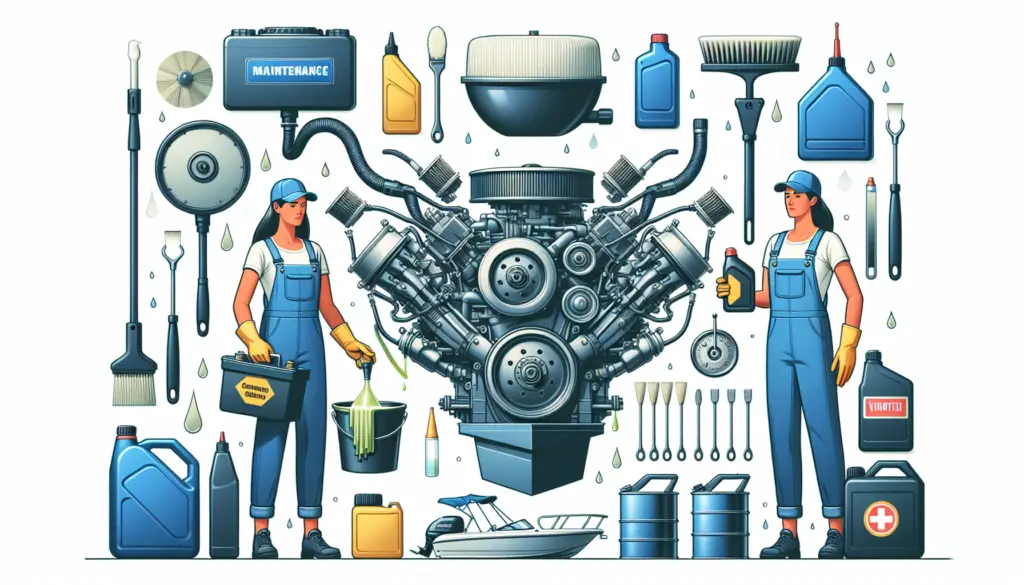
Changing the Engine Oil Regularly
Regularly changing the engine oil is a critical maintenance task for a boat engine. Engine oil plays a pivotal role in engine operation, which brings us to the next section.
Understanding the Role of Engine Oil
Engine oil performs a number of functions. It lubricates engine parts to prevent friction and resultant wear and tear, cools down the engine by carrying away the heat, and removes any sludge or debris. Essentially, engine oil ensures a smooth and efficient operation.
When and How Often to Change Engine Oil
Typically, engine oil must be changed every 100 hours of operation or at least once a year. However, this could vary depending on the manufacturer’s recommendations and your boat usage. The process involves draining the old oil, changing the oil filter, and refilling with fresh, high quality oil.
Choosing the Correct Engine Oil
Choosing the correct engine oil is crucial for your boat engine. The type of oil required depends on factors such as the type of your engine (inboard or outboard), your engine’s age, and weather conditions. You should ideally consult your owner’s manual or a trusted mechanic to decide the right type.
Maintaining the Cooling Systems
Just as with any engine, boat engines produce heat. Maintaining the cooling systems is key to keep your engine from overheating.
The Role of Cooling Systems in a Boat Engine
Boat engines, especially inboards, use water-cooled radiators (or heat exchangers) to maintain the engine temperature. The cooling systems play an essential role in taking away the heat the engine produces and maintaining an optimal working temperature.
Signs of an Inefficient Cooling System
Common signs of an inefficient cooling system include overheating, decrease in power, steam from the exhaust, and coolant leaks. Regularly checking your boat’s temperature gauge and exhaust can prove helpful in identifying such issues.
How to Maintain and Repair Your Boat’s Cooling System
Appropriate maintenance can prevent most cooling system problems. This involves regularly checking and topping off coolant levels, inspecting the condition of belts and hoses, and cleaning debris from raw water strainers. If there’s a problem that you can’t handle, a qualified mechanic should be brought in.
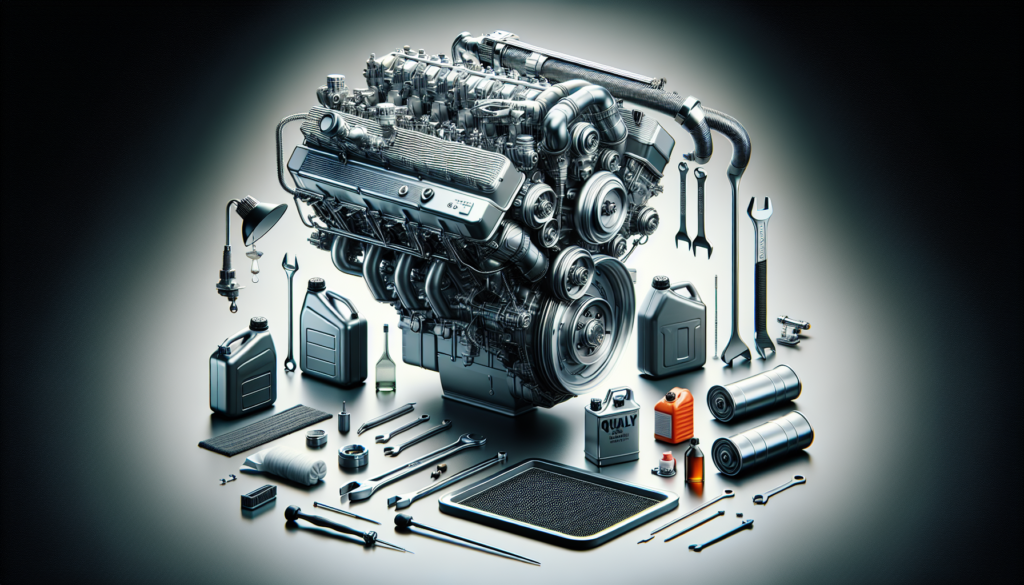
Routine Inspection of the Fuel System
Fuel system is another crucial component of your boat engine. regular inspections can ensure optimal performance and reduce chances of breakdowns.
Understanding the Role of the Fuel System
The fuel system of your boat engine is responsible for storing and delivering fuel (gasoline or diesel) to the engine. An efficient fuel system ensures your boat engine runs smoothly and efficiently.
Potential Problems With the Fuel System and Their Signs
Common fuel system problems include fuel leaks, dirty fuel, and clogged fuel filters. These can manifest as difficulty in starting the engine, poor engine performance, or even unexpected breakdowns.
How to Maintain a Healthy Fuel System
To maintain an efficient fuel system, check for leaks regularly, ensure the use of clean fuel, and replace fuel filters at recommended intervals. Regular system inspections by a professional can also aid in identifying and rectifying potential issues.
Implications of Engine Overheating
Engine overheating is a common issue encountered by boat owners. This implies that your engine is running hotter than it should, which can lead to serious damage if not addressed promptly.
Signs of an Overheating Engine
The most obvious sign of an overheating engine is if the temperature gauge reads higher than normal. Other signs can include loss of power, steam or smoke from the engine, and a strong smell of engine coolant.
Possible Causes of Engine Overheating
Engine overheating can be caused by several issues including a clogged coolant system, leaking coolant, defective thermostat, or a damaged water pump. Regular inspections can help identify these issues early and prevent an overheating situation.
How To Prevent and Address Engine Overheating
Preventing engine overheating is all about proactive maintenance. Ensure the coolant system is clean and properly filled, the water pump is in good condition, and the thermostat is functioning properly. If overheating does occur, stop running the engine immediately and allow it to cool down. After that, identify and rectify the cause.
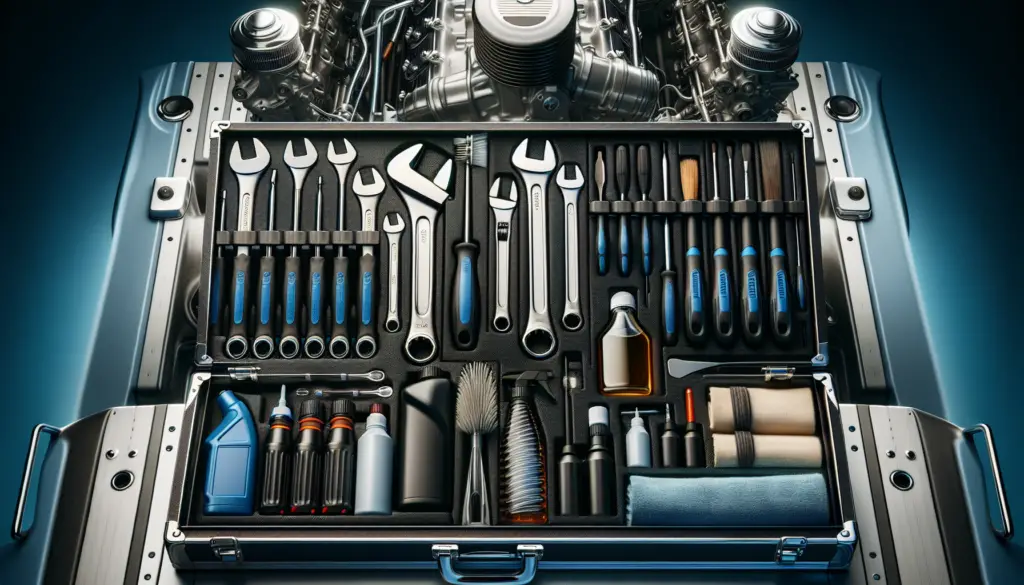
Properly Storing Your Boat
Whether you’re storing your boat for the winter or for a shorter period in between trips, proper storage is critical for maintaining a healthy engine.
How Storage Conditions Impact Engine Health
Storage conditions directly impact the engine health. High humidity can lead to corrosion, and extreme temperature swings can lead to cracking or other damage. Furthermore, inactivity can result in issues like oil drainage or battery drainage.
Best Practices for Storing Your Boat
Proper storage involves cleaning the boat thoroughly, topping off the fuel tank, disconnecting the battery, and possibly removing the propeller. Indoor storage in a climate-controlled environment is best, but if that’s not possible, a boat cover is a good investment.
De-winterizing Your Boat’s Engine for Use
De-winterizing essentially involves reversing the winterizing process. This involves reconnecting the battery, checking and topping off all fluids, inspecting the propeller, and checking the entire boat for any signs of damage or wear.
Maintaining the Battery
A healthy battery is key for a smooth running engine and an enjoyable boating experience.
Importance of a Healthy Battery for a Smooth Engine
A healthy battery ensures that the engine starts easily and the boat’s electrical systems function effectively. A failing battery can lead to problems such as difficulty starting the engine or the loss of lights, communication, and navigation systems when needed most.
Signs of a Failing Battery
Common signs of a failing battery include difficulty in starting, dimming lights, and reduced functionality of electrical equipment. A battery that’s old (3-5 years or more) can also be a sign it’s time to replace it.
How to Maintain and Replace Your Boat’s Battery
To maintain your battery, ensure it’s fully charged before use and stored in a fully charged state. Regular inspections and clean-ups can prevent corrosion. As for replacement, you should consider doing so every 3-5 years, or if you repeatedly face starting troubles.
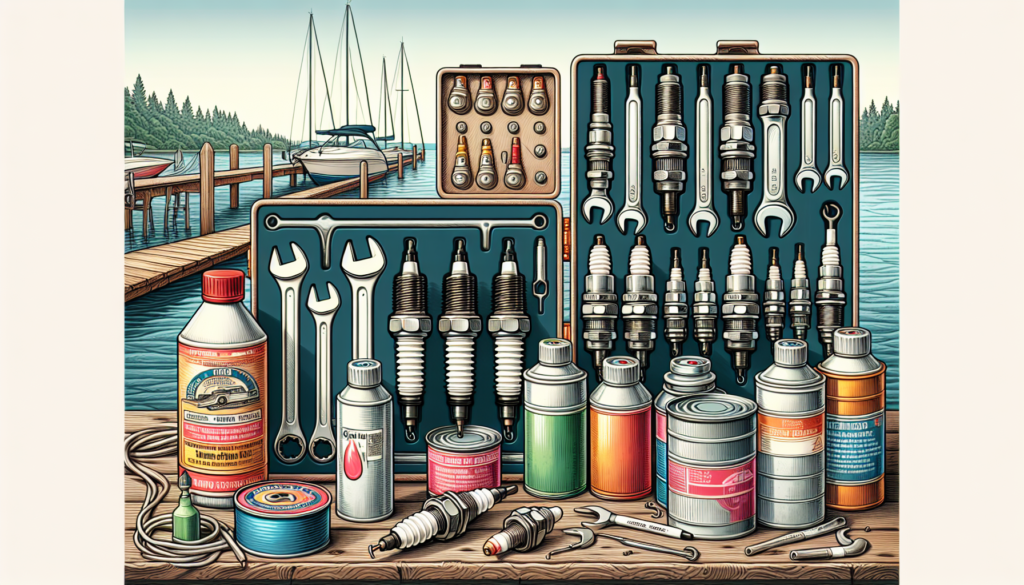
Importance of Regular Engine Check-up
Benefits of Professional Engine Inspections
Professional engine inspections are beneficial as they help detect potential problems early, prevent unexpected breakdowns, and extend the lifespan of your engine.
How Often to Get a Professional Check-up
A general rule of thumb is to get a professional check-up at least once a year. However, if you boat heavily, you may want to consider check-ups more frequently.
Finding a Trustworthy Boat Mechanic
The key to finding a trustworthy boat mechanic involves research, seeking recommendations, and reading reviews. Also, ensure the mechanic is certified and has experience with your specific type of boat engine.
Maintenance of the Propeller
Lastly, let’s talk about the propeller – a key player in your boat engine’s functioning.
Role of the Propeller in Engine Performance
The propeller transmits the power generated by the engine to the water, propelling your boat forward. A well-maintained propeller ensures efficient power transmission, thereby enhancing your boat performance.
Signs of Propeller Issues
Signs of propeller issues include vibrations, excessive splashing, poor boat handling, and a decrease in speed or efficiency.
How to Maintain and Replace a Boat Propeller
To maintain a propeller, routinely remove and inspect it for any damage or debris. You can clean it using mild soap water and a soft brush. Lubricate the propeller shaft to prevent corrosion and replacement should be considered when there’s significant damage.
A well-maintained boat engine not only enhances your boating experience but also extends the life of your beloved boat. Regular cleaning, timely oil changes, efficient cooling and fuel systems, optimal battery health, engine check-ups and a well-maintained propeller collectively make your boat engine run smooth and quiet. Happy Boating!

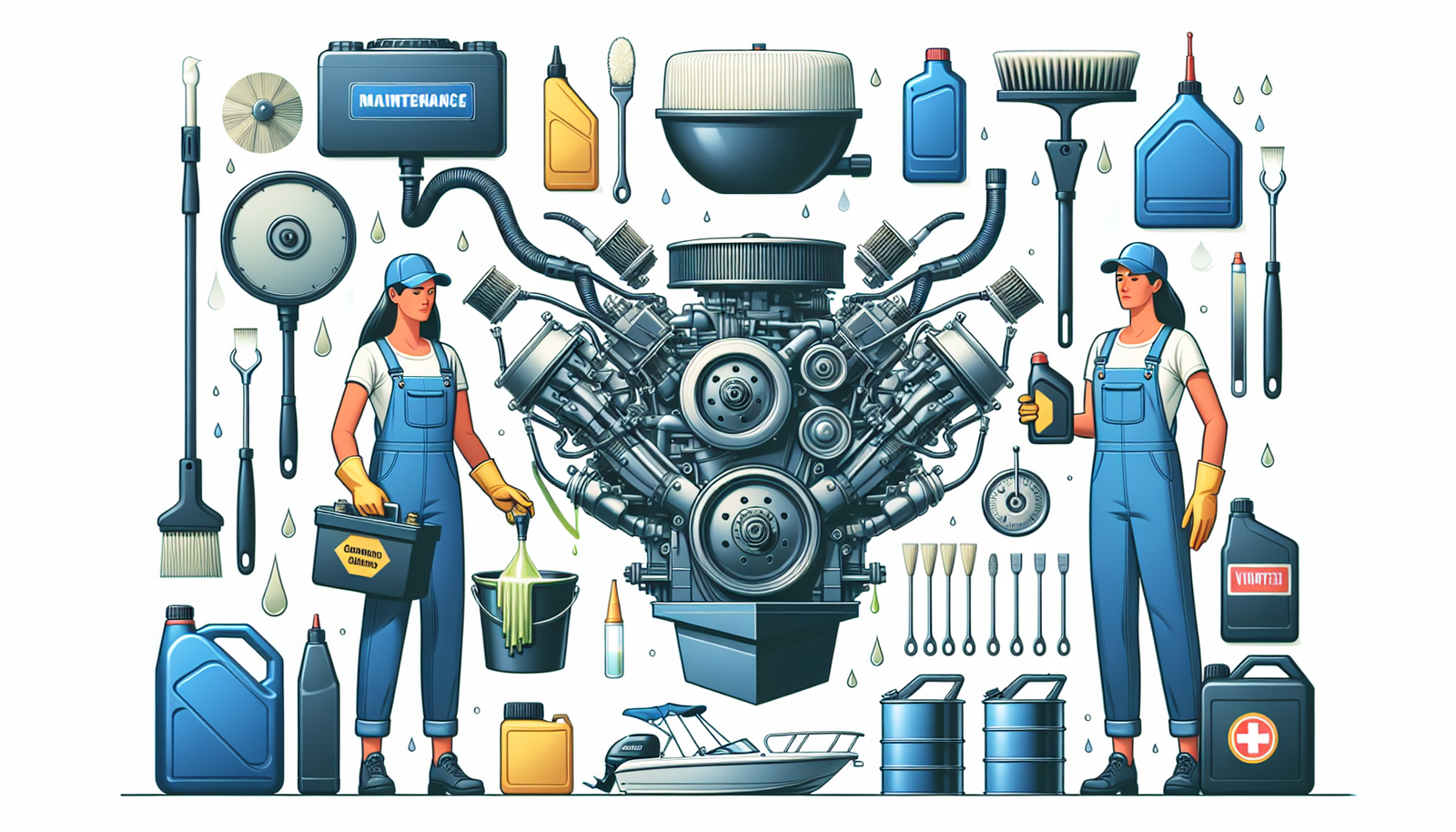
[…] It’s essential to establish the health of your boat’s engine. Regular assessments will help you spot potential failures early on and maintain optimum engine performance. […]